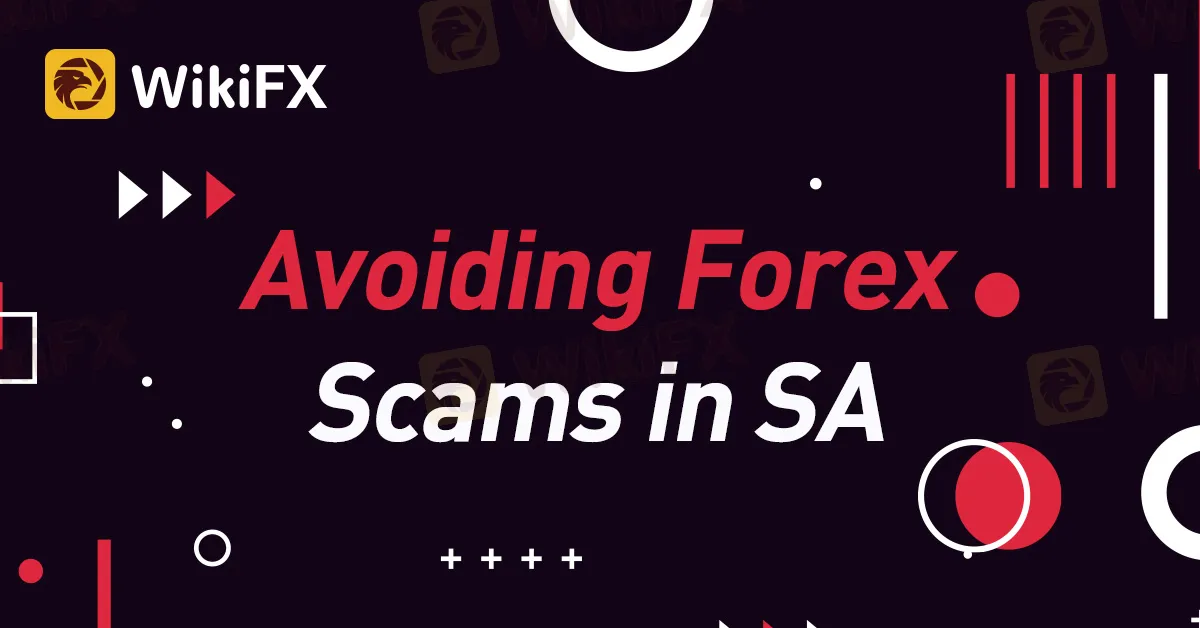简体中文
繁體中文
English
Pусский
日本語
ภาษาไทย
Tiếng Việt
Bahasa Indonesia
Español
हिन्दी
Filippiiniläinen
Français
Deutsch
Português
Türkçe
한국어
العربية
Avoiding Forex Scams in SA
Abstract:Forex scams can be found in any country, and South Africa is no exception. Here are some tips to help you avoid forex scams in South Africa: Be wary of unsolicited offers: If you receive an unsolicited offer to invest in forex, be cautious. Scammers often use cold calls, spam emails, and social media messages to lure people into their schemes.

Forex scams can be found in any country, and South Africa is no exception. Here are some tips to help you avoid forex scams in South Africa:
Be wary of unsolicited offers: If you receive an unsolicited offer to invest in forex, be cautious. Scammers often use cold calls, spam emails, and social media messages to lure people into their schemes.
The best way to avoid forex scams is by downloading the WikiFX app. WikiFX is a forex broker inquiry that allows traders to rate and review brokers from all over the world. The app is available on the appstore and playstore.
Check the credentials of the company or individual: Do some research on the company or individual who is offering you the opportunity to invest in forex. Look for regulatory bodies that oversee their operations, such as the Financial Services Board (FSB) in South Africa.
Look for red flags: Some common red flags to watch out for include unrealistic promises of high returns, pressure to invest quickly, and requests for upfront fees or personal information.
Understand the risks: Forex trading carries inherent risks, and it is important to understand these risks before you invest. Remember that no investment is guaranteed, and you should be prepared to lose some or all of your investment.
Use a reputable broker: A reputable broker will be regulated by a regulatory body and will be transparent about their fees and charges. Be sure to do your due diligence and choose a broker that has a good reputation.
Don't fall for guarantees: If someone promises you guaranteed returns or tells you that their investment strategy is foolproof, be suspicious. There is no such thing as a guarantee in the world of forex trading, and any claims to the contrary should be treated with caution.
Be cautious of social media marketing: Scammers often use social media platforms to promote their schemes, so be wary of any investment opportunities that you see on social media.
Get independent advice: If you are considering investing in forex, it is always a good idea to seek independent financial advice from a qualified professional. This can help you make an informed decision and avoid being scammed.
By following these tips, you can help protect yourself from forex scams in South Africa. Remember to always do your due diligence and be cautious of anyone who is offering you an opportunity to invest in forex, especially if it seems too good to be true.

Disclaimer:
The views in this article only represent the author's personal views, and do not constitute investment advice on this platform. This platform does not guarantee the accuracy, completeness and timeliness of the information in the article, and will not be liable for any loss caused by the use of or reliance on the information in the article.
Read more

Authorities Alert: MAS Impersonation Scam Hits Singapore
MAS scam alert: Scammers impersonate officials, causing $614K losses in Singapore since March 2025. Learn how to spot and avoid this impersonation scam.

Billboard Warns of Crypto Scams Using Its Name – Stay Alert!
Billboard warns against fake crypto scams using its brand. Learn how to spot fraud and protect yourself from fake promotions.

Rising WhatsApp Scams Highlight Need for Stronger User Protections
UK consumers lose £2,437 on average to WhatsApp scams. Revolut demands stricter verification and AI monitoring to combat rising fraud on Meta platforms.

A Trader’s Worst Mistake: Overlooking Broker Reviews Could Cost You Everything
In today’s digital age, reviews influence nearly every decision we make. When purchasing a smartphone, television, or home appliance, we pore over customer feedback and expert opinions to ensure we’re making the right choice. So why is it that, when it comes to choosing an online broker where real money and financial security are at stake many traders neglect the crucial step of reading reviews?
WikiFX Broker
Latest News
The Withdrawal Trap: How Scam Brokers Lure Victims into Paying More
FCA to Investors: Think Twice Before Trusting These Brokers
Trump\s tariffs: How could they affect the UK and your money
Trump gambles it all on global tariffs he\s wanted for decades
TradingView Brings Live Market Charts to Telegram Users with New Mini App
Trump tariffs: How will India navigate a world on the brink of a trade war?
Interactive Brokers Launches Forecast Contracts in Canada for Market Predictions
Authorities Alert: MAS Impersonation Scam Hits Singapore
Stocks fall again as Trump tariff jitters continue
IG Group Acquires Freetrade for £160M to Expand UK Investment Market
Currency Calculator







